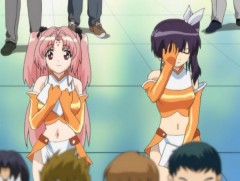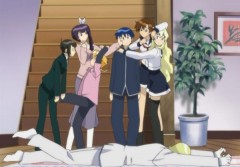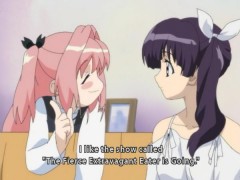Girls Bravo is still … (somewhat) bravo!
What they say:
Yukinari’s got major girl problems – the poor guy is literally allergic to them. He can’t even be in the same room as a girl without getting a rash. It’s enough to put any red-blooded male in an awful mood. Here’s the good news: things start looking up for Yukinari when he accidentally plays peek-a-boo with the naked girl next-door. She freaks out and boots him in the face, magically transporting our hero to the coolest place ever: Seiren, a mystical land populated mostly by girls. As soon as he gets there, he meets Miharu, a super-bouncy, carefree cutie who can touch Yukinari without causing a rash! She becomes his roomie on Earth and… Well, then it’s all bathtubs, swimming pools, hot springs, and you’re not even reading this anymore, are you?
Content: (please note that content portions of a review may contain spoilers)
 There was really only one thing Girls Bravo was good for when it aired on Fuji Television way back in July of 2004: Ei Aoki’s proverbial foot in the door. Though he’d done storyboarding and episode direction here and there previously, Aoiki’s professional credibility for directing a full series seems to have been accomplished, no matter how unbelievably, by Girls Bravo. After this, Aoki went on to direct Ga-Rei-Zero, Hourou Musuko (Wandering Son), Fate/Zero and, most recently, a series (Aldnoah.Zero) based on a concept by Gen Urobuchi! This is not to lend credit to Girls Bravo itself, but rather to say that there might be more to this animated adaptation of the manga by Mario Kaneda than meets the eye.
There was really only one thing Girls Bravo was good for when it aired on Fuji Television way back in July of 2004: Ei Aoki’s proverbial foot in the door. Though he’d done storyboarding and episode direction here and there previously, Aoiki’s professional credibility for directing a full series seems to have been accomplished, no matter how unbelievably, by Girls Bravo. After this, Aoki went on to direct Ga-Rei-Zero, Hourou Musuko (Wandering Son), Fate/Zero and, most recently, a series (Aldnoah.Zero) based on a concept by Gen Urobuchi! This is not to lend credit to Girls Bravo itself, but rather to say that there might be more to this animated adaptation of the manga by Mario Kaneda than meets the eye.
Before I knew of the ani-blogosphere, some misguided path or random recommendation on rentanime.com (or maybe the box art) brought me to Girls Bravo. After watching the third episode, writhing in pain with breathless laughter, I decided to introduce a similarly minded friend to it; we ended up watching the rest together after he had a similar reaction. We pretty much agreed on what tickled us so: the unapologetic, male chauvinistic humor; the sleight of boob execution (I’ll explain later); Lisa Fukuyama’s introduction, as well as the delivery of lines from Fukuyama siblings and Kirie. People would give me the most judgmental looks whenever I named Girls Bravo as one of my favorite guilty pleasures, and I never understood why. I’d quote lines from episodes only to be looked at as if I’d watched the wrong show. Then I asked one of those critics if he’d watched the dub. He said, “No.” I thought, “ahhhhhhh.”
 Aside from, but in reality relying upon, the Ecchi, Ecchi, Ecchi, Ecchi, Poontang, Zoom-Boioioioioing of it all, one of the few sources of appreciation for this series ten years later lies in the efforts of ADR director Patrick Seitz and ADR scriptwriters Seitz and Jonathon Klein. Seriously, the only way to fully understand the impact of the ADR on this series is to watch with the subs on while listening to the dub cast. The detailed dialog—present in Kazuharu’s over-the-top, libido-spurred declarations; Koyomi’s subsequent denials; or any other number of instances of intricate banter—as well as some serious script ad-libbing add up to a palpable humor that punctuates perfectly the prevalent perversion to allow a breath of objectivity. (If I’m destroying the humor by analyzing it, I’m doing this correctly.) This is what I meant by sleight of boob execution: boobs may be in frame but the focus is on the funny.
Aside from, but in reality relying upon, the Ecchi, Ecchi, Ecchi, Ecchi, Poontang, Zoom-Boioioioioing of it all, one of the few sources of appreciation for this series ten years later lies in the efforts of ADR director Patrick Seitz and ADR scriptwriters Seitz and Jonathon Klein. Seriously, the only way to fully understand the impact of the ADR on this series is to watch with the subs on while listening to the dub cast. The detailed dialog—present in Kazuharu’s over-the-top, libido-spurred declarations; Koyomi’s subsequent denials; or any other number of instances of intricate banter—as well as some serious script ad-libbing add up to a palpable humor that punctuates perfectly the prevalent perversion to allow a breath of objectivity. (If I’m destroying the humor by analyzing it, I’m doing this correctly.) This is what I meant by sleight of boob execution: boobs may be in frame but the focus is on the funny.
Even without the benefit of localized audio, Girls Bravo has a lot to offer via its use of comedic timing and repetition. In-episode running gags, such as using the baseball team’s repetitive laps to make sight gags about Kirie’s violent temper, but using it twice in the same way to utilize the comedic power of “again,” and using it a third time but with variation to introduce Miharu on school grounds (arriving with the jogging baseball team), is so thoughtlessly perfect you’ll hate yourself for laughing. In another episode, men are cat-calling and proposing to Kirie in varying degrees (up to an actual proposal), and then a small kid asks her to be on his baseball team, which highlights the absurdity of such an onslaught. (In the dub, this comes full creepy otaku circle as the kid asks Kirie to be his big sister). Other instances can just be a matter of carry through, like someone getting a nosebleed from a sexy situation and then showing up after a cut with a pair of noseplugs in the background. But not all the humor in Girls Bravo is a punchline.
 Owing its WTF-ness to a thoroughly storyboarded setup and execution (as well as some damned fine voice acting on Hunter M. Austen’s part), one of the funniest moments, and probably the one that got me hooked on the series, is the introduction of Lisa Fukuyama. She’s introduced as an avid believer of horoscopes, runs into a situation that matches one absurdly specific foretelling, and, after having monologued away her opportunity by rambling on about fortune granted her by the dark lord Mabanya, starts talking to imaginary conspirators. Prime setup for a nut-job, right? When it’s revealed later that Lisa was actually addressing covert agents (bodyguards) who were hiding and that she’s been a practitioner of black magic for a long time, the execution of the joke pulled over on the audience is rather amazing for what would otherwise be such a banal rom-com series.
Owing its WTF-ness to a thoroughly storyboarded setup and execution (as well as some damned fine voice acting on Hunter M. Austen’s part), one of the funniest moments, and probably the one that got me hooked on the series, is the introduction of Lisa Fukuyama. She’s introduced as an avid believer of horoscopes, runs into a situation that matches one absurdly specific foretelling, and, after having monologued away her opportunity by rambling on about fortune granted her by the dark lord Mabanya, starts talking to imaginary conspirators. Prime setup for a nut-job, right? When it’s revealed later that Lisa was actually addressing covert agents (bodyguards) who were hiding and that she’s been a practitioner of black magic for a long time, the execution of the joke pulled over on the audience is rather amazing for what would otherwise be such a banal rom-com series.
Compounding this is the use of absurdity. Legions of maids toting semiautomatic rifles in a labyrinth? Pleasure mansion filled with ever-progressing doors of depravity? Ghosts of headless buffalo, flying fish, and little children? That’s all in one episode! That may be all well and good, you say, but throwing crazy into a pot and stirring doesn’t mean a thing without contrast, right? Yeah, Aoki knows it; that episode’s bumper is poor puny Yukinari—the show’s wimpy, whiny, easily forgettable protagonist—lost in the same maze he entered at the beginning of the episode and literally forgotten by the rest of the crew. What’s so great about that? I’ll give you ten to one odds the viewer forgot about him too, pointing out just how much of a disposable type of character he is. It’s a rather brilliantly executed joke in what would otherwise be an insipid series and takes an entire episode’s length in order to appreciate. But we’re not done yet.
 Because Girls Bravo is all about the funny, and intricate jokes take time to set up, the series is also filled with instances playing to spontaneous over-exaggeration and nonchalance. One of my favorite instances comes after the series establishes, throughout a number of episodes, that Kirie constantly inflicts physical harm on Kazuharu via wrestling moves in retribution for his lecherous actions against her physical person. In one instance, the consequence of this actually sticks; Kazuharu’s skull, after Kirie piledrives him into the school floor, stays as it was forced when thusly pummeled: perpendicular. And it stays that way for the rest of the episode. Similarly violent, but carried out with an nonchalance bordering on apathy that plays to the funny bone is a gag involving one of Lisa’s bodyguards casually shooting Kazuharu with a gun. Sure, it turns out to be a tranq gun, but until Kazuharu revives (only to be shot again and again with the same second nature manner), this is not clear and all the funnier for it since the series exudes the sense that anything can happen.
Because Girls Bravo is all about the funny, and intricate jokes take time to set up, the series is also filled with instances playing to spontaneous over-exaggeration and nonchalance. One of my favorite instances comes after the series establishes, throughout a number of episodes, that Kirie constantly inflicts physical harm on Kazuharu via wrestling moves in retribution for his lecherous actions against her physical person. In one instance, the consequence of this actually sticks; Kazuharu’s skull, after Kirie piledrives him into the school floor, stays as it was forced when thusly pummeled: perpendicular. And it stays that way for the rest of the episode. Similarly violent, but carried out with an nonchalance bordering on apathy that plays to the funny bone is a gag involving one of Lisa’s bodyguards casually shooting Kazuharu with a gun. Sure, it turns out to be a tranq gun, but until Kazuharu revives (only to be shot again and again with the same second nature manner), this is not clear and all the funnier for it since the series exudes the sense that anything can happen.
Girls Bravo wrapped up its second season on April 21, 2005 on WOWOW. Ten years after its premiere, after exposure to a greater quantity of similar series, I’ll say that Girls Bravo still has several legs up on the competition (both then and now) in its genre for its skillful use of comedy, but the lead thereby gained is a scant one. This largely results from me simply having grown up. Countered by the weight of empathy inspired by experience, Kazuharu’s unrestrained actions now only come across as pervasively invasive and threatening towards women on multiple levels. Whereas once the introduction of Tomoko and Ebi were just rather unnerving additions to the cast, their inclusion as otaku bait in a show with ecchi overtones is immediately offensive and deplorable. Although the whole shebang boils down, as most harem comedies do, to wish fulfillment, occasionally there’s an episode not about objectifying/humiliating women.
 This comes through particularly in the episode with Yuknari’s and Miharu’s first date, which almost manages to be touching. It also speaks kindly of the series that it never points out that Miharu and Yukinari have become comfortable as a couple. They’re never outright defined as such. Instead, the series intimates the affections of the vapid couple through moments of casual tenderness—hands on shoulders or in hands—as a stark contrast to the show’s overriding theme of grotesque fondling. On top of this, the four main characters do actually grow to some degree: Kirie and Kazuharu in particular but Yukinari to some degree as well. Unfortunately, Miharu remains not so much dumb as simple … really simple. (Would this be what is typically referenced as male fantasy if she weren’t?) She’s introduced as a stomach with huge breasts, pink hair, a mission to please, and a tendency to subconsciously cause explosions from the get-go and unfortunately stays that way throughout the series.
This comes through particularly in the episode with Yuknari’s and Miharu’s first date, which almost manages to be touching. It also speaks kindly of the series that it never points out that Miharu and Yukinari have become comfortable as a couple. They’re never outright defined as such. Instead, the series intimates the affections of the vapid couple through moments of casual tenderness—hands on shoulders or in hands—as a stark contrast to the show’s overriding theme of grotesque fondling. On top of this, the four main characters do actually grow to some degree: Kirie and Kazuharu in particular but Yukinari to some degree as well. Unfortunately, Miharu remains not so much dumb as simple … really simple. (Would this be what is typically referenced as male fantasy if she weren’t?) She’s introduced as a stomach with huge breasts, pink hair, a mission to please, and a tendency to subconsciously cause explosions from the get-go and unfortunately stays that way throughout the series.
While not a selling point, the visuals still holds up. Character designs are not exactly to scale, but that’s for obvious reason, and I’ll even go so far as to give the designers credit for the depths of the wardrobes available for each (female) character. Yukinari and Kazuharu usually stick to their school uniforms, but girls in the show hardly ever wear the same thing twice. Hell, in “Fight Bravo,” Kirie changes a good ten times. All of these are intended, of course, to showcase the characters’ assets, but even this is mental trickery. Girls Bravo may make a point of tightly wrapping its ludicrously busty babes in bright colors with revealing cuts, but I don’t think the show has a single moment where that’s a joke. In fact, any time there’s nudity or compromised clothedness (and trust me, there are many), the tone is generally one of awkwardness and/or simple, unfortunate, shameless pandering.
Formerly licensed by Geneon and currently licensed by FUNimation (who’da thunk it?), Girls Bravo initially won me over ten years ago with its juvenile bravado, overly obvious innuendo, and some seriously good laughs. (All I have to say is “banana scene.”) Although my laughter this time around was due in equal parts to the show’s shamelessness, its writing, and its execution, that I laughed at all at and with a run-of-the-mill ecchi rom-com stacked with fanservice means there’s something that makes this show in particular stand out against the myriad other otaku-pandering shows I can no longer stand to watch. In the end, I’ll blame the ADR work of the script writers, the vocal talents of Liam O’Brien and Lulu Chiang (with lesser but notable mentions of Hunter M. Austen and Carrie Savage) as well as the original storyboarding and direction for my continued enjoyment of this title.





